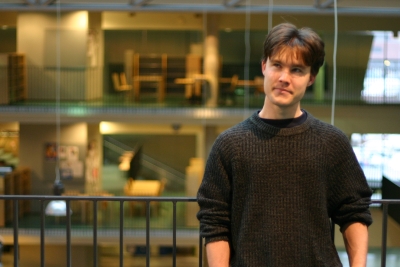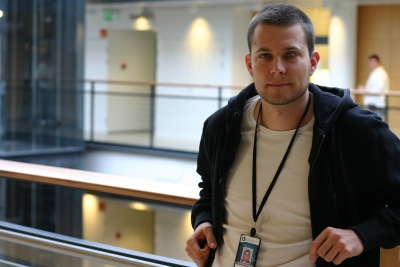Career in bioinformatics
MBI graduates will be able to obtain positions in industrial and academic facilities such as biomedical companies, universities and research institutions. A bioinformatician often acts in a multidisciplinary environment with people from both methodological sciences, and biosciences and medicine. It is thus important that a bioinformatician is able to master topics from different disciplines.
Bioinformatics in the Helsinki area
MBI interviewed bioinformaticians in the Helsinki region how they feel about studying and working in the field.
 Leo Lahti is a postgraduate researcher in the
Statistical Machine Learning and Bioinformatics group
at
Helsinki University of Technology.
Leo Lahti is a postgraduate researcher in the
Statistical Machine Learning and Bioinformatics group
at
Helsinki University of Technology.
Why did you choose bioinformatics?
I have always been interested in math and science, and these are the subjects I originally went to study at Helsinki University of Technology. While looking for a subject for my diploma, I stumbled on this field. It sounded interesting and I was accepted into a research group. Bioinformatics combines a wide spectrum of different disciplines, and the methods can be applied in other fields, as well. Life as an application field sounded great. Life and how it comes into existence has always fascinated me.
What is your advice for graduates entering the bioinformatics programme?
It is important that you be able to form a general idea of the focal research objects of this field. It is also vital to orientate yourself on one or two sub-fields according to your own interests, and to learn the basics of computational methods thoroughly. Instead of details, you must be aware of common structures and learn to formulate biological problems in a mathematical format.
 Sirkku Karinen is a second year MSc student in the MBI programme.
She is preparing her MSc thesis at the
Computational Systems Biology Laboratory,
University of Helsinki.
Sirkku Karinen is a second year MSc student in the MBI programme.
She is preparing her MSc thesis at the
Computational Systems Biology Laboratory,
University of Helsinki.
Why did you choose bioinformatics?
I discovered bioinformatics when I studied biology as a minor subject. I saw the possibilities of computer science in solving problems in natural science. Questions of biology offer truly challenging computational problems, and the solutions are evident in practice, too.
Why is bioinformatics important?
With the event of new technologies, it is possible to produce more and more data for research in biology and medicine. The data are already so large that it is impossible for humans to analyze them manually. Bioinformatics is vital for making useful interpretations of biological data.
The computational modelling of complex biological systems is more interesting than merely analyzing the data. This is a wonderful opportunity for trying to understand the workings of the systems.
 Marko Laakso graduated from the MBI programme in 2007. He is currently
a postgraduate researcher at the Computational Systems Biology Laboratory,
University of Helsinki.
Marko Laakso graduated from the MBI programme in 2007. He is currently
a postgraduate researcher at the Computational Systems Biology Laboratory,
University of Helsinki.
What is your advice for graduates entering the bioinformatics programme?
I recommend applying to research groups or the industries in this field. When your work duties are close to your studies, you will get much more out of the courses. Through practice, the relations between things you learn and their meaning become much clearer than if your are just studying the theoretical side.
Bioinformatics is essentially cross-disciplinary research, so it is a good idea to take a wide range of courses and minor subjects. The application areas of bioinformatics may vary a great deal, so there is demand for both chemists and doctors, for example.
What do you do? What is a typical working day like for you?
I am a Doctoral student at the Institute of Biomedicine at the University of Helsinki. We are developing computational methods for biomedical research.
A typical work day includes reading articles and books, analysis of data, and development of methods for their processing. For my post-graduate studies, I use part of my time for lectures and writing assignments. In practice, all the projects are collaborations between several research groups. For the collaborations to work, some time has to be spent on negotiations and correspondence with partners.
 Teemu Kivioja is a
postdoctoral researcher working
in the
Institute of Biomedicine,
and
Department of Computer Science,
University of
Helsinki.
Teemu Kivioja is a
postdoctoral researcher working
in the
Institute of Biomedicine,
and
Department of Computer Science,
University of
Helsinki.
What do you do? What is a typical working day like for you?
I work as a researcher in Jussi Taipale's laboratory in Biomedicum at the University of Helsinki, and in Esko Ukkonen's research group at the Department of Computer Science. I also work at the newly established company PlexPress a few hours a week. The company utilizes the results of my PhD research. PlexPress sells a measuring method, but they need a bit of computation to support it.
On a good day, I either talk to biologists about what they need to compute, or to computer scientists about how to compute what we need to compute. Then I try to compute it, i.e. I write program code. The computation assignments range from trivial to impossible, which makes my job interesting.
Where do you think bioinformatics will be in 20 years' time?
Bioinformatics will no longer be a buzzword in 20 years' time. The computational methods have been incorporated into biosciences completely. In molecular biology, robots will be carrying out most of the routine lab work, and the focus of the work will have moved to designing experiments and interpreting results. People with skills enough for this new way of doing things will be the ones carrying out research and development in biosciences and biotechnology. I imagine that the bioinformatics programme is one of the places where you can get these skills today - unless you stop learning after you graduate. Luckily, it is always fun to learn new things.